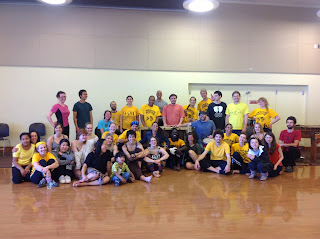What better way to celebrate the end of the festival, and the winding down of the school year, than with a roda in the sun after practice?
Many thanks, again, to Ethan for all his work this year! and it was great to have Devin back for a couple of days.
Tuesday, June 4, 2013
Sunday, June 2, 2013
A great festival
Many thanks to Ethan for all the hard work!
And thanks to Dora Oliveira, Manimou Camara, Mestre Silvinho, and especially Contra Mestre Andrea!
And thanks to Dora Oliveira, Manimou Camara, Mestre Silvinho, and especially Contra Mestre Andrea!
 |
| A women's Bateria |
 |
| Contra-Mestre Andrea and Leika about to start playing |
 |
| Oxani doing a ponte. |
 |
| A group photo after the West African Dance class led by Maninou Camara |
Labels:
p'ra homen menino e mulher,
photos
a bit of history and perspective
The article below was written by Mestra Paulinha, of Grupo Nzinga. I found it in the archives of the blog hosted by FICA DC.
In the beginning of the 1980s, the creation of the Grupo de Capoeira Angola Pelourinho (GCAP) in Rio de Janeiro and later in Bahia marked a significant change in the situation. Founded by Mestre Pedro Moraes Trinidade (Mestre Moraes), GCAP implemented a series of actions promoting the re-valorization of Capoeira Angola and the recognition of the importance of old and famous mestres, such as Mestre Pastinha himself. With an ideology that affirmed capoeira’s African roots and denounced the injustices suffered by so many capoeiristas and Afro-descendents, this group was the precursor of a movement that became wide and diverse.
Through the realization of events in homage to Mestre Pastinha, GCAP managed to reunite old practitioners of Capoeira Angola and attract new admirers and people interested in learning the traditional game. The format of these events was innovative because it created bridges between the practitioners of Capoeira Angola and other segments of society such as: religious leaders, especially those linked to the Candomblés of Angola; anti-racist organizations of the “black movement”; organizations involved with other forms of black culture; intellectuals and scholars; and governmental organizations, especially in the cultural area. In some years, these events gained larger proportions, assuming a national and international character, and began to be held by other nascent groups of Capoeira Angola, mainly during the 1990s. Such events were established as an important part of a regular calendar activities that helped to construct the new community of “angoleiros”.
One important aspect of the ideology and actions implemented by the Capoeira Angola groups created in this period involves the denunciation of racism in Brazil. The events promoted in memory of Mestre Pastinha, carried out on the date of his death (November 13th), soon became part of the agenda of commemorations and reflections of the National Day of Black Consciousness (November 20th). More than a coincidence of dates, this approximation reveals a process of growing politicization in the universe of Capoeira Angola, synchronized with the general trend in the black cultural scene in Bahia...
... This community became very heterogeneous – including people of various ethnic and racial origins, social classes, nationalities, genders, ages, and sexual orientations- and this has been the backdrop for the construction of the angoleiro’s identity. Therefore, affirming oneself as an “angoleiro(a)” today implies dealing with diversity, rejecting any ideal of purity and homogeneity.
In the beginning of the 1980s, the creation of the Grupo de Capoeira Angola Pelourinho (GCAP) in Rio de Janeiro and later in Bahia marked a significant change in the situation. Founded by Mestre Pedro Moraes Trinidade (Mestre Moraes), GCAP implemented a series of actions promoting the re-valorization of Capoeira Angola and the recognition of the importance of old and famous mestres, such as Mestre Pastinha himself. With an ideology that affirmed capoeira’s African roots and denounced the injustices suffered by so many capoeiristas and Afro-descendents, this group was the precursor of a movement that became wide and diverse.
Through the realization of events in homage to Mestre Pastinha, GCAP managed to reunite old practitioners of Capoeira Angola and attract new admirers and people interested in learning the traditional game. The format of these events was innovative because it created bridges between the practitioners of Capoeira Angola and other segments of society such as: religious leaders, especially those linked to the Candomblés of Angola; anti-racist organizations of the “black movement”; organizations involved with other forms of black culture; intellectuals and scholars; and governmental organizations, especially in the cultural area. In some years, these events gained larger proportions, assuming a national and international character, and began to be held by other nascent groups of Capoeira Angola, mainly during the 1990s. Such events were established as an important part of a regular calendar activities that helped to construct the new community of “angoleiros”.
One important aspect of the ideology and actions implemented by the Capoeira Angola groups created in this period involves the denunciation of racism in Brazil. The events promoted in memory of Mestre Pastinha, carried out on the date of his death (November 13th), soon became part of the agenda of commemorations and reflections of the National Day of Black Consciousness (November 20th). More than a coincidence of dates, this approximation reveals a process of growing politicization in the universe of Capoeira Angola, synchronized with the general trend in the black cultural scene in Bahia...
... This community became very heterogeneous – including people of various ethnic and racial origins, social classes, nationalities, genders, ages, and sexual orientations- and this has been the backdrop for the construction of the angoleiro’s identity. Therefore, affirming oneself as an “angoleiro(a)” today implies dealing with diversity, rejecting any ideal of purity and homogeneity.
Labels:
capoeira philosophy
Subscribe to:
Posts (Atom)

